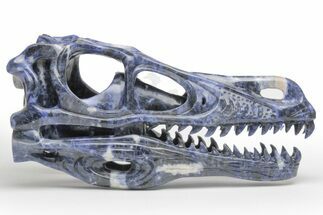POLISHED SODALITE
Sodalite is a royal blue mineral that is almost always veined with white streaks and markings. This mineral is often very easily confused with lapis lazuli, since they look strikingly similar. The major difference between the two is that lapis lazuli is often speckled with glittery pyrite flakes. Lazurite, the mineral that gives lapis lazuli its blue color, is part of the sodalite group of feldspathoids, which explains their similarity in appearance. While it is most commonly a classic blue color, sodalite can be a variety of other colors, ranging between pink, gray, green, colorless, brown, and white. These other colors are very rare and are extremely collectible should they appear. This mineral usually occurs in massive form in igneous veins, and only a few scattered deposits produce the ever-desirable dodecahedral crystals.
Sodalite is named for its sodium content (“soda”) and is an important mineral in the gem trade. This stone is often cut into slabs or cabochons for polishing and jewelry making. Sodalite is desirable to jewelry makers as a cheaper alternative to lapis lazuli, which is rather mind-boggling because both minerals are almost equally rare! Sodalite's rich blue and wild streaking are very desirable patterns for a mineral, and specimens of this species make superb display pieces. The lack of pyrite does not hurt this mineral’s appearance at all!
Sodalite is named for its sodium content (“soda”) and is an important mineral in the gem trade. This stone is often cut into slabs or cabochons for polishing and jewelry making. Sodalite is desirable to jewelry makers as a cheaper alternative to lapis lazuli, which is rather mind-boggling because both minerals are almost equally rare! Sodalite's rich blue and wild streaking are very desirable patterns for a mineral, and specimens of this species make superb display pieces. The lack of pyrite does not hurt this mineral’s appearance at all!
Polished Hearts
(2)
Pocket Stones
(1)
Polished Slabs
(1)
Spheres
(1)
Worry Stones
(1)
25 Items
($5 to $295)
 Reviews
Reviews
























